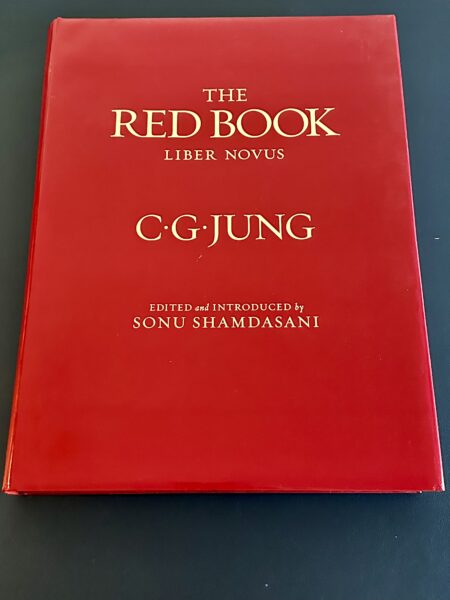
Long before their falling-out, Carl Jung shared a tragic memory in a letter to Sigmund Freud: “… as a boy I was the victim of a sexual assault by a man I once worshipped” (cited in John Kerr’s A Most Dangerous Method). Jung also shared his infatuation with Freud: “… my veneration for you has something of the character of a ‘religious crush’.” Jung’s feelings, if not projection, must have intensified the pain of losing his friend and mentor, a loss often described as a catalyst for Jung’s mental breakdown and experiments in active imagination, contributing to the creation of The Red Book and Jung’s analytical psychology.
No doubt Jung’s feelings for Freud complicated their relationship. The crush may have felt similar to what he initially felt for the man who assaulted him. Jung’s dynamics with Freud may have felt similar too. Perhaps Jung had a compulsion to overcome a sense of oppression activated by the earlier assault that he was unconsciously working through in his relationship with Freud. We’ll never know. Although Jung did acknowledge the loss of Freud forced him to face a deep split within himself he navigated in ways that denied much of who he was.
Yet by the time Jung wrote The Red Book he could declare, “the brightness of love seems to come from the fact that love is visible light and action.” Something profound happened between his mental breakdown and his magnum opus akin to what some psychotherapists call a healing journey. How else could Jung speak so ebulliently of love? At least on some level, and likely a very deep one, The Red Book shows how one very brilliant man overcame the psychic splintering and profound alienation that commonly haunt survivors of sexual abuse.
Unfortunately, not everyone is as resilient or fortunate as Jung. Far too many feel as if parts of themselves die with sexual abuse, along with their hope to ever know safe, true love.
However, Jung was not unusual in his transformation of trauma into creative works. Sexual traumas, especially incest, have a long history of being associated with both genius and madness. In a letter discussing philosophers, Arthur Schopenhauer wrote to Johann Wolfgang von Goethe the following about his beliefs about the influence of incest:
“He must be like Sophocles’ Oedipus, who, seeking enlightenment concerning his terrible fate, pursues his indefatigable inquiry, even when he divines that appalling horror awaits him in answer. But most of us carry in our hearts the Jocasta, who begs Oedipus for God’s sake not to enquire further; and we give way to her and that is the reason why philosophy stands where it does.”
And Friedrich Nietzsche wrote in The Birth of Tragedy:
“Wherever soothsaying and magical powers have broken … the magic circle of nature, extreme unnaturalness — in this case, incest — is the necessary antecedent, for how should man force nature to yield up her secrets but by successfully resisting her, that is to say, by unnatural acts?”
The Red Book reveals Jung’s creative genius — his “soothsaying” abilities — for discovering both the process and wisdom of integrative, spiritual self-repair. In the book he struggles with distinctions and divisions between good and evil, self and society, shadow and persona. For his efforts, he is rewarded with transformation of the fragmented parts of himself and confrontation with the whole of his being. Although the stories, contemplations, and images found in The Red Book are uniquely Jung’s, they nevertheless speak to a sense of feeling as Other, to oneself as well as to humanity, that is nearly universal of the experience of sexual trauma, especially when it occurs in the first decades of life.
In her semi-autobiographical novella, Mathilda (1819), Mary Wollstonecraft Shelly (also the author of Frankenstein) described the alienation caused by sexual abuse:
“My father had forever deserted me, leaving me only memories which set an eternal barrier between me and my fellow creatures … [His] unlawful and detestable passion has poured its poison into my ears, and changed all my blood, so that it was no longer the kindly stream that supports life but a cold fountain of bitterness corrupted in its very source. It must be the excess of madness that could make me imagine that I could ever be aught but one alone; struck off from humanity; bearing no affinity to man or woman; a wretch on whom Nature had set her ban.”
Feelings of guilt, shame, and inferiority are alienation’s emotional signature. But so is righteous anger, the desire to protect the vulnerable, and often a rugged, if not peculiar, sense of humor.
Unresolved sexual trauma does not cause a jaded abandonment of the desire to love or to be loved, but rather a lost capacity to trust love. And so the vacillating, like planets in erratic orbits that can’t establish the safest distance from the sun. Well-grounded observers may gratefully consume the creative energy released through the revolutions, although only the creator can say if the suffering was worth the trajectory.
Book References
Nietzsche, Friedrich. 1872/2008. The Birth of Tragedy, Oxford World’s Classics. New York: Oxford University.
Jung, Carl G. 2009. The Red Book: Liber Novus. New York: W. W. Norton & Co.
Kerr, John. 1994. A Most Dangerous Method: The Story of Jung, Freud, and Sabina Spielrein. New York: Vintage Books.
Shelley, Mary Wollstonecraft. 2011. Mathilda. London: eBook Versions.
Revised and from the archive, Originally published 27 January 2013.
